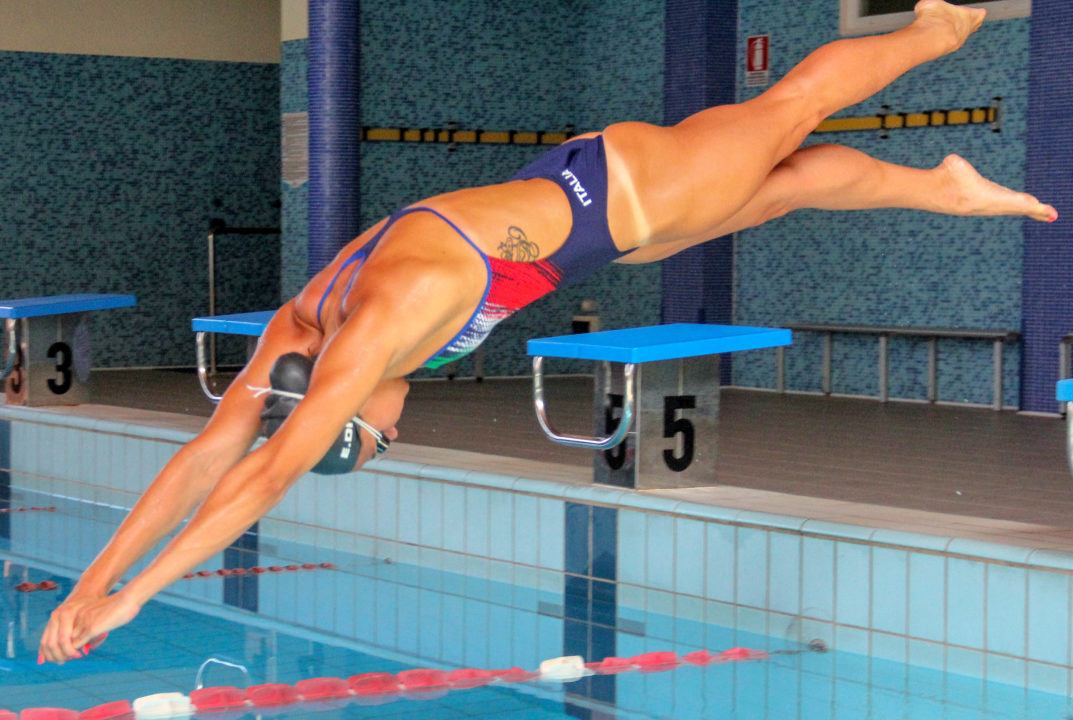SwimSwam welcomes reader submissions about all topics aquatic, and if it’s well-written and well-thought, we might just post it under our “Shouts from the Stands” series. We don’t necessarily endorse the content of the Shouts from the Stands posts, and the opinions remain those of their authors. If you have thoughts to share, please send them to share@swimswam.com.

Nicole M. LaVoi, PhD
This “Shouts from the Stands” submission comes from Nicole M. LaVoi, Ph.D., Co-Director of the Tucker Center for Research on Girls & Women in Sport.
Recently, a piece sharing the data on lack of women head swimming and diving coaches at the collegiate level was posted here on swimswam.com. That data is part of my research at the Tucker Center for Research on Girls & Women in Sport at the University of Minnesota.
The data shared was accurate: swimming and diving both get an F grade on our Women in College Coaching Report Card, at the NCAA D-I level and a D grade for both at the D-III level. What this means is that less than 1 in 4 collegiate female swimmers are coached by a same sex role model, and that fewer men get the benefit of a cross-sex role model. Let me contrast that by stating that nearly ALL (~96-98%) men’s collegiate teams are coached by men. Swimming and diving is unique in that it is a “co-ed” sport so we’d think we’d see more women coaches. Yet many college programs have a Director of Swimming that oversees both the men’s and women’s programs, and based on the data we know that person is rarely a woman.
WHY DO WOMEN COACHES MATTER?
I get this question a lot, so let me offer up some evidence-based reasons why women in sport leadership positions matter.
First, sport is one of the most visible and powerful social institutions in world. Who is seen and known in the world of sports, like head coaches, communicates who is important, relevant and valued (and who is not).
Second, girls and young women want and need female role models, like former female athletes who become coaches, who have experienced many of the same issues in their sport. Same sex role models provide emulation, aspiration, self-esteem, and valuation of abilities. Many girls grow up NEVER having had a female coach, whereas 100% of their male peers have had a male coach.
Third, when boys and men experience women as competent leaders in a context that matters greatly to them (i.e., sport), they are more likely to respect women, see females as equal colleagues, friends, and intimate partners, and are less likely to sexually objectify women.
Fourth, when girls and young women see females in coaching roles they will more likely think about coaching as a legitimate and viable career, and may aspire to become a coach. Women coached by women are more likely to go into and stay in coaching!
Fifth, sport organizations with more women coaches on staff will likely have different perspectives at the decision making table, which, according to the data, is positive for any workplace.
Sixth, women coaches need to see and interact with other women coaches for friendship, networking, support, career advice, mentorship, counseling and help in navigating a male-dominated workplace.
Seventh, when women are tokens in the workplace (<24%) it is often detrimental to mental and physical health outcomes. Female swimming & diving coaches often endure and experience alienation, feeling highly visible and subjected to scrutiny, having to overperform to gain credibility, feeling pressure to conform to organizational norms and endure increased risk for gender discrimination in the forms of sexual harassment, wage inequities, and limited opportunities for promotion; all caused by their minority status in the workplace. Over time, this takes its toll and many women coaches burnout and leave the profession.
Eighth, decades of data indicate 99% of sexual abusers and molesters of all athletes (female and male) at all levels of sport are male (see Brackenridge, 2001). With increased concerns of athlete health, wellbeing and safety, increasing the number of women coaches and gender diversity in the workplace might expedite advancement and achievement of these important goals.
In sum, women love to coach and are competent coaches. Women love to coach just as much as men, but due to the system and culture of swimming and diving they are often denied the opportunity afforded to male peers or face such an inhospitable workplace (and that means at the national, organizational, athletic department or club level) that they quit something they are passionate about and good at!
Women coaches matter, and swimming and diving has some work to do to make this a reality.
About Nicole M. La Voi, PhD
Nicole M. LaVoi, Ph.D. is a Senior Lecturer in the area of social and behavioral sciences in the School of Kinesiology at the University of Minnesota where she is also the Co-Director of the Tucker Center for Research on Girls & Women in Sport. She received MA (’96) and doctoral degrees (’02) in Kinesiology with an emphasis in sport psychology/sociology from the University of Minnesota. After completing her graduate work, Dr. LaVoi was a Research & Program Associate in the Mendelson Center for Sport & Character at the University of Notre Dame (2002-‘05) where she helped launch the Play Like a Champion character education through sport series, and was also an instructor in the Psychology Department. LaVoi was an Assistant Professor of Physical Education and the Head Women’s Tennis Coach at Wellesley College (1994-’98), and the Assistant Women’s Tennis Coach at Carleton College (1991-’93).
Through her multidisciplinary research she answers critical questions that can make a difference in the lives of sport stakeholders—particularly girls and women. As a leading scholar on women coaches LaVoi has published numerous book chapters, research reports and peer reviewed articles across multiple disciplines. Her seminal research includes the annual Women in College Coaching Report Card which is aimed at retaining and increasing the number of women in the coaching profession, and a groundbreaking book Women in Sports Coaching (2016). She also collaborates with colleagues on media representations of females in sport, including co-producing an Emmy-winning best sports documentary titled Media Coverage & Female Athletes: Women Play Sports, Just Not in the Media (2013), and has a new documentary with tptMN coming out in November 2018 titled Game ON: Women Can Coach. As a public scholar she speaks frequently to sport stakeholders around the globe and serves on national advisory boards for the Sports Advocacy Netowrk of the Women’s Sport Foundation, espnW and WeCOACH (formerly the Alliance of Women Coaches). She is also the founder and director of the annual Women Coaches Symposium held on the U of MN campus which serves over 350+ women coaches of all sport and all levels. LaVoi focuses her research on the relational qualities of the coach-athlete relationship, the physical activity of underserved girls, the barriers and supports experienced by female coaches, and media representations of girls and women in sport.
LaVoi played four years of intercollegiate tennis at Gustavus Adolphus College where her team placed 4th (’89), 2nd (’91) and won the NCAA-III National Championships in 1990. She is a two-time NCAA Academic All-American.

Im curious to know if its similar in high school swim and dive? From what I see it may be more diverse but would love to know if there’s research for that level.
There are 1,800+ positions open for those wanting to get into the sport. Assuming that there is geographical diversity in the 1,800+ positions, who, exactly, cannot obtain the position of their dreams or, at the very least, gather additional experience to make them the candidate of choice for the next position that opens up in the NCAA?
Sometimes I am reminded of what Confucius had to say about this: “Man who stand on hill with mouth open will wait long time for a roast duck to drop in.”
Your insights are very compelling. The one point you did not make is that women are very likely to have a foundation of knowledge about the ways to make women athletes perform better. Your own background is likely to make you a better coach of both men and women.
Many male coaches are great recruiters. They also understand many components of the sports they teach. However, they are probably not as good at the physical fitness and preparation as are women. In the book Nine Innings, about the 2001 World Series, Charles Euchner highlighted the work fitness coach Edith Heuss did with one of the Diamondback athletes, Steve Finley, who credited her with helping him have a 20-year career… Read more »
No data just observations of teachers lately in the news but i think #8is changing. Still far more men but as society has blurred gender roles and porn is more easily accessible i think there has been a bit of a shift of the sexual abusers percentage. A 2001 study is dated.
Is this based on any updated data? Or just a gut-level assumption?
Thank you!
Reason #1– competency and excellence in coaching are not limited or restricted to any gender. They are qualities easily seen if you try. What matters is whether our eyes are open.
How about just the simple fact that many women make excellent coaches!
Dr. Lavoi, Thank you! Thank you! Thank you! Hopefully this article, coupled with the recent Swim Brief podcast with Susan Teeter, can help some people who had such ridiculous reactions in the comments section of the article sharing the research.